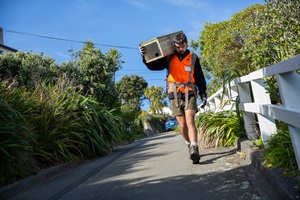Speaking at the launch, James Willcocks, Predator Free Wellington Project Director said the new funding will generate 42 full time jobs across Wellington.
“Originally a ten year project, with this new funding we can fast track our project and aim to become the world’s first predator free capital city within the next 5 years.
“The aim is to completely eradicate rats, possums, stoats and weasels from the entire Wellington Peninsula, a total area of 30,000 hectares, and in a city where around 212,000 people live.
“In 2019, Predator Free Wellington began NZ’s biggest urban eradication project on the Miramar Peninsula this involved laying 8,000 traps and bait stations, 1,800 community traps and 13,000 detection cards, and resulted in tens of thousands of rats killed.
“The removal of rats and weasels on the Miramar Peninsula is almost complete, this was the first phase of our project. We are now ready to step into the next eradication phase, Island Bay to CBD. We can then continue rolling out the eradication in phases until we reach the city boundary at Porirua,” James said.
Wellington City Council and Greater Wellington Regional Council are both significant funders in Predator Free Wellington, alongside philanthropic organisation NEXT Foundation and Predator Free 2050 Ltd.

Daran Ponter, Chair, Greater Wellington Regional Council said: “An urban eradication of this scale hasn’t been done in New Zealand before. Miramar Peninsula was the testing ground for us and it’s working.
It’s been amazing to see the results first in the form of birdlife, like kākā and kākariki, returning to the peninsula for the first time,” Daran said.
NEXT Foundation Environmental Advisor Devon McLean says the additional funding is a boost to Wellington but will ultimately benefit all of Aotearoa/New Zealand.
“Predator Free Wellington is a template for urban eradication throughout the country,” he says.
“The lessons being learned in the capital will strongly contribute to a methodology for creating other Predator Free cities - an important part of the bigger puzzle of a Predator Free New Zealand by 2050.“
"Wellington has shown it's ready to scale up the project, a testimony to the mahi of its people,” Devon said.
Prof Dan Tompkins, Acting CEO of Predator Free 2050 Limited says the team is excited by the progress Wellington is making.
"The suburb-by-suburb approach, working alongside residents to permanently remove predators is a proving ground for the predator free 2050 effort," Prof Tompkins said.
Mayor Andy Foster says Wellington is on a world leading environmental restoration journey and this fantastic investment by Government will supercharge our vision to become predator free city wide.
“It comes after the incredible effort of volunteers involved in the Miramar Peninsula project, an area which is now on the verge of being totally rat and mustelid free. The funding boost is a wonderful endorsement for our Wellington City volunteer army of thousands who trap pests in backyards and reserves and, the partnership between Wellington City and Regional Councils and NEXT Foundation.
“This work by key stakeholders is central to the ongoing restoration of native birdsong, lizards and insects to New Zealand’s Capital City,” Mayor Andy Foster said.
Project Phases:
Phase 1 – Miramar Peninsula (almost complete)
Phase 2 – Island Bay to CBD (2020-2021)
Phase 3 – The Port via Zealandia to Te Kopahou
Phase 4 – Kaiwharawhara to Makara
Phase 5 – North to the city boundary.
Employment creation
The nature of an urban eradication means it's labour-intensive with line cutting, weekly trap/bait station checking and regular communication with residents. Locally, we created 30 full time jobs for the phase one Miramar Peninsula eradication project, with this additional investment we will create 42 new full-time jobs for the next five years.
The types of people we employ means we could transition forestry employment or other field based employment into Predator Free Wellington for field delivery roles and airline/travel/hospitality staff into the engagement and customer facing roles easily.
About Predator Free Wellington
The vision of Predator Free Wellington is to create the world’s first predator free capital city where communities and native biodiversity thrive. The aim is to completely eradicate rats, possums, stoats and weasels from the entire Wellington Peninsula, a total area of 30,000 hectares. This transformational project is a world first, delivered in our capital city where around 212,000 people live.
Methodology
Predator Free Wellington will undertake a staged eradication across five phases. The first phase started on Miramar Peninsula in 2019 with the plan going forward to move out over the rest of Wellington in four separate eradication projects - ending at the border with Porirua City.
Phase one in the Miramar Peninsula has given us a proof of concept to deliver this world first and means we now have a proven methodology to replicate and deliver over the rest of the city.
To give an idea of scale: The Miramar Peninsula eradication covered an area which is home to around 20,000 people and required 3,000 individual permissions from homeowners, business owners and other stakeholders to implement and service the eradication grid over six months. The second phase involves 19 suburbs - from Kilbirnie around to Island Bay and up through to the CBD - and is an area that is home approximately 60,000 people.